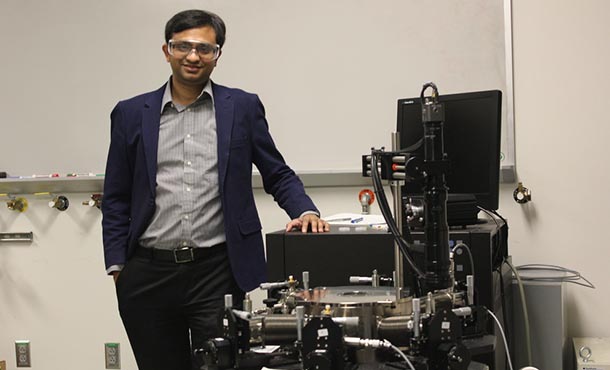
Saptarshi Das, assistant professor of engineering science and mechanics, is exploring next-generation, low-power devices for sustainable computing. IMAGE: PROVIDED BY SAPTARSHI DAS
Engineering researcher receives CAREER Award to develop straintronic tech
3/3/2021
By Gabrielle Stewart
UNIVERSITY PARK, Pa. — Computing is everywhere — in large sectors such as manufacturing and health care or devices like your smartphone, car and coffeemaker. With a five-year, $500,000 National Science Foundation (NSF) grant, Saptarshi Das, assistant professor of engineering science and mechanics, plans to develop a new nanoelectronic technology to reduce the energy consumed by computing on a global scale.
“We do so much computing in every hour of our daily lives,” Das said. “Each operation consumes energy, and if we do not tackle the energy problem, we do not have a sustainable future.”
Transistors, key components of computing devices and other electronics that control electrical current, are conventionally made of silicon. Such transistors are reaching a point where they can’t be scaled down further while energy needs of devices continue to grow.
“Because we have reached a fundamental limit in physics for reducing the size and energy consumption of silicon transistors, we need a new device that can beat that limit,” Das said. “This straintronic device could be one solution.”
Straintronics is a relatively new research area focusing on the enhancement of electronic devices by introducing forces that cause a resulting displacement, called strain, on materials and influence their electrical properties. Das, who previously led a federally funded center on energy-efficient computing, plans to build on preliminary straintronics research to design and experimentally build a novel, low-power straintronic field-effect transistor (SFET).
The SFET consists of a transistor stacked on top of an actuator. When electricity is applied to the actuator, it will expand upward and compress the transistor. With the right transistor materials, according to Das, this push will change the conductivity of the transistor and therefore make the transistor effective in switching current on and off.
Das and his team will compare the efficiency of the SFET to traditional transistors as well as other alternatives to silicon transistors currently in the research phase. Though this project will focus on the performance of SFETs at the individual device level, Das aims to further evaluate their efficiency at larger scales. Performance can vary from the device level to the circuit level consisting of connected devices to the architecture level made up of many circuits, Das said.
The long-term goal for this fundamental research is to create ultra-low-power computing tools that can serve as the building blocks for architectures of everyday computing devices or communications technology in remote locations, such as deep oceans.
The grant will also allow Das to pilot educational workshops for high school and undergraduate students interested in science, technology, engineering and math. He plans to supplement the workshops with webinars and educational videos.
“We want to provide students with a mindset that energy consumption is a critical issue,” Das said. “Working in engineering and electronic devices, you can contribute to a better future and to solving the grand challenges of the 21st century.”
The CAREER Award is the NSF’s most prestigious award, given in support of early-career faculty who have the potential to serve as academic role models in research and education and to lead advances in the mission of their department or organization.



